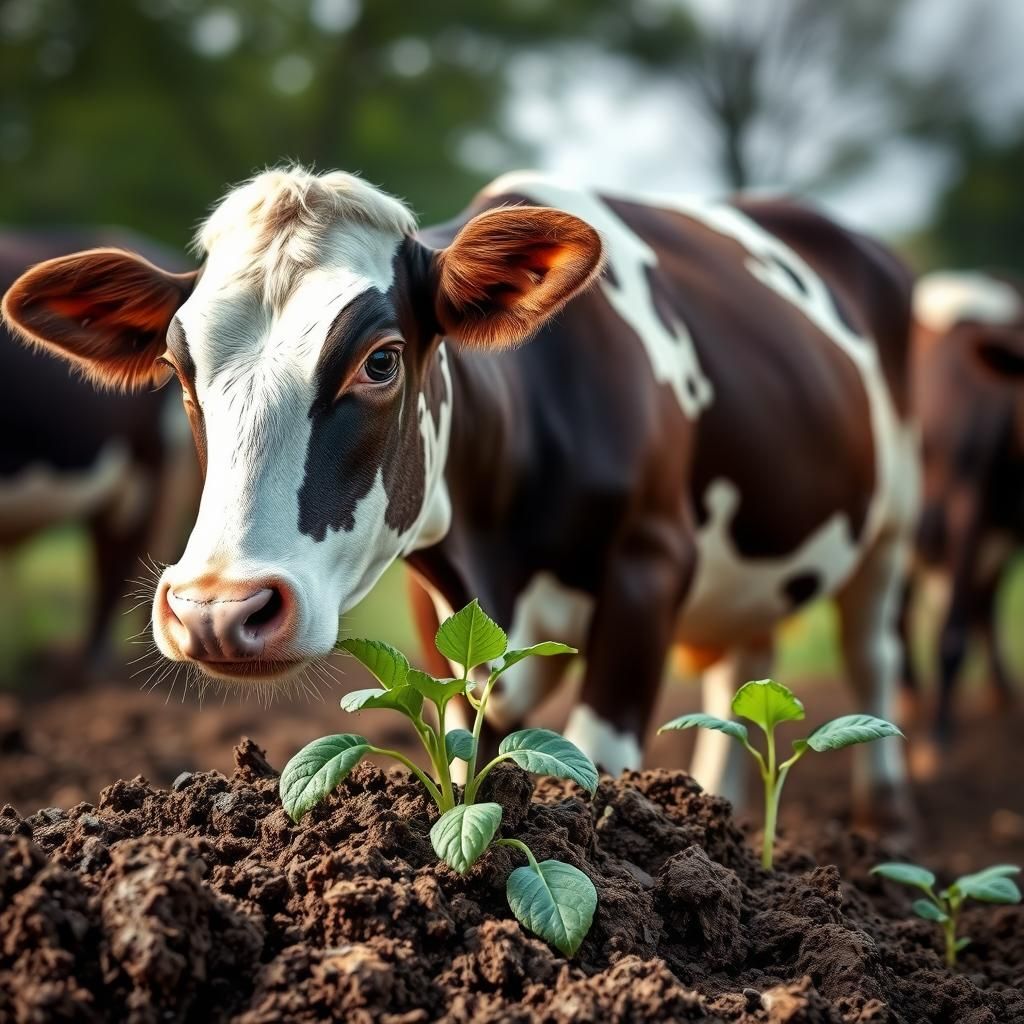Why is Cow Poop Good Fertilizer? Benefits and Uses Explained

Cow poop, often overlooked, is a powerhouse in the world of organic fertilizers. Rich in essential nutrients like nitrogen, phosphorus, and potassium, cow manure enhances soil fertility and promotes healthy plant growth. Its natural composition not only supports the development of crops but also improves soil structure, leading to better water retention and aeration. Understanding the benefits and practical uses of cow poop as fertilizer is crucial for sustainable agriculture and gardening. This article delves into the science behind cow manure, exploring its advantages, application methods, and how it can contribute to a healthier ecosystem.
Why is Cow Poop Good Fertilizer?
Cow poop, or manure, is an excellent fertilizer due to its rich nutrient content, including nitrogen, phosphorus, and potassium—the three primary nutrients essential for plant growth. It not only provides these nutrients but also enhances soil structure, improving its ability to retain moisture and support beneficial microbial activity. The natural decomposition process of cow manure releases these nutrients slowly, making them available to plants over an extended period, unlike synthetic fertilizers that may provide an immediate but short-lived nutrient boost. Furthermore, using cow manure helps recycle waste and promotes sustainable farming practices, reducing environmental impact while enriching the soil.
Rich Nutrient Profile
Cow manure is particularly valuable for its balanced nutrient profile, which includes a significant amount of macro and micro-nutrients. The nitrogen found in cow poop promotes leaf growth, while phosphorus is crucial for root development and flowering, and potassium enhances overall plant health and disease resistance. This combination not only supports healthy plant growth but also contributes to higher yields in agricultural practices.
Soil Structure Improvement
Incorporating cow manure into the soil helps improve its structure by increasing aeration and drainage. The organic matter within cow poop contributes to the formation of soil aggregates, which promotes a healthy balance of air and moisture. This is vital for root development and the overall health of the plants, as it ensures that roots can access nutrients and water efficiently.
Slow Nutrient Release
One of the key benefits of cow manure as fertilizer is its ability to provide a slow release of nutrients. Unlike chemical fertilizers that can lead to nutrient leaching and can burn plants if over-applied, cow manure breaks down slowly, releasing nutrients gradually. This slow release helps maintain a stable nutrient level in the soil, supporting plants consistently throughout their growth cycle.
See also:
Supports Microbial Activity
Cow manure is a powerhouse for promoting microbial activity in the soil. The beneficial bacteria and fungi found in cow poop play a crucial role in the nutrient cycling process. These microorganisms help break down organic matter, making nutrients more accessible to plants and improving overall soil health. A thriving microbial community also enhances disease suppression, making crops more resilient.
Waste Recycling and Sustainability
Using cow manure as fertilizer is an effective way to promote sustainable agricultural practices by recycling waste. Rather than being disposed of, livestock manure can be repurposed to enrich the soil, reducing the reliance on chemical fertilizers. This process contributes to a circular economy in farming, where waste products are transformed into valuable resources for improved crop production.
| Nutrient | Function |
|---|---|
| Nitrogen | Promotes leafy growth |
| Phosphorus | Supports root and flower development |
| Potassium | Enhances plant health and disease resistance |
| Organic Matter | Improves soil structure and moisture retention |
| Microbial Activity | Increases nutrient availability |
The Nutrient-Rich Composition of Cow Manure
Cow poop, commonly known as cow manure, is an excellent fertilizer primarily due to its nutrient-rich composition, which includes essential elements like nitrogen, phosphorus, and potassium. These macro-nutrients play critical roles in plant growth, promoting healthy root development and improving overall crop yield. Furthermore, cow manure contains a considerable amount of organic matter that enhances soil structure, improving water retention and promoting beneficial microbial activity. Its slow-release nature allows a steady supply of nutrients over time, making it a sustainable option for agricultural practices.
Understanding the Nutritional Value of Cow Manure
Cow manure is rich in macronutrients such as nitrogen, phosphorus, and potassium, which are vital for various plant processes. Nitrogen is crucial for the growth of leaves and stems, while phosphorus supports root development and flowering. Potassium enhances overall plant strength and disease resistance. Additionally, cow feces are a source of micronutrients that may not be abundantly present in synthetic fertilizers, making it a more balanced option for soil health.
The Environmental Benefits of Using Cow Manure
Using cow manure as fertilizer can significantly lower environmental impact compared to synthetic alternatives. It helps in reducing chemical runoff into waterways, which can lead to pollution and eutrophication. By recycling waste from dairy and beef production, we promote a more sustainable agricultural system. Additionally, the use of organic manure like cow dung can improve soil biodiversity, enhancing the ecosystem's health.
See also:
Application Methods for Cow Manure
Cow manure can be applied to the soil through various methods, including direct incorporation, composting, and as a liquid slurry. Direct incorporation involves mixing fresh manure into the soil, which can release nutrients quickly but may also introduce pathogens if not managed properly. Composting manure helps break down pathogens and stabilizes nutrients, making it safer for plants and the environment. Meanwhile, liquid manure can be spread using specialized equipment, ensuring even distribution and effective nutrient uptake.
Timing and Considerations for Using Cow Manure
For optimal effectiveness, timing is crucial when applying cow manure. It is best to apply the manure during the active growing season or prior to planting, allowing plants to utilize the nutrients efficiently. However, it’s essential to consider soil moisture levels and weather conditions to avoid nutrient leaching. Moreover, testing soil for existing nutrient levels can help determine the appropriate amount of manure to apply, preventing over-fertilization and potential negative impacts on plant health.
Cows and Sustainable Agriculture Practices
Integrating cow manure into farming promotes sustainable agriculture by creating a closed-loop system where waste products are converted back into valuable resources. This practice not only enhances soil fertility but also supports carbon sequestration, thus contributing to climate change mitigation. Moreover, using cow dung lessens dependence on chemical fertilizers, reducing the carbon footprint associated with conventional farming methods, and encouraging healthier ecosystems.
Questions from Our Readers
Why is cow poop considered a good fertilizer?
Cow poop is considered a good fertilizer because it is rich in nutrients essential for plant growth, such as nitrogen, phosphorus, and potassium. These nutrients promote healthy root development, flowering, and fruiting in plants. Additionally, cow manure improves soil structure and enhances its ability to retain moisture, making it an effective organic amendment for gardens and farms.
How does cow manure improve soil quality?
Cow manure improves soil quality by increasing microbial activity, which helps break down organic matter and release nutrients into the soil. The organic matter also enhances soil aeration and drainage, creating a better environment for root growth. Moreover, it helps balance soil pH, making it more favorable for growing a variety of crops.
See also:
Can cow poop be used directly in the garden?
Using cow poop directly in the garden is not recommended without proper composting or aging. Fresh cow manure can contain pathogens and weed seeds that may harm plants and pose health risks. Composting the manure allows it to decompose, killing harmful bacteria and making it a safer, nutrient-rich addition to the soil.
What are the environmental benefits of using cow manure as fertilizer?
Using cow manure as fertilizer offers several environmental benefits, including reducing waste by repurposing livestock byproducts that would otherwise contribute to landfill issues. It promotes sustainable farming practices by minimizing reliance on synthetic fertilizers, which can lead to soil degradation and water pollution. Additionally, organic manure enhances biodiversity in soil ecosystems, supporting healthier agricultural systems.

If you want to read more articles like Why is Cow Poop Good Fertilizer? Benefits and Uses Explained, we recommend you check out our Fertilisers category.
Leave a Reply
Related Articles